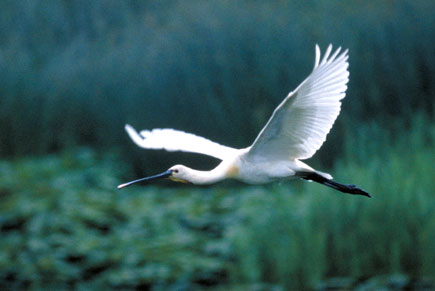EuroNatur calls for a secure flyway for migratory birds over the Adriatic Sea

Flying Spoonbill, (c) D. Haase
© Dieter Haase
Press release, January 29, 2007
Radolfzell. Uncontrolled hunt and loss of habitat is increasingly threatening waterbird populations, alerts the European Nature Heritage Fund EuroNatur on the occasion of the World Wetlands Day.
According to EuroNatur, the global decline in numbers of waterbirds can only be stopped by comprehensive protection measures. Says EuroNatur president Claus-peter Hutter: "Also in Europe, and especially on the flyways over the Mediterranean, populations of numerous species of waterbirds are dramatically decreasing". "Species such as the Northern lapwing, the black-tailed godwit or the ferruginous duck will not be able to recover in Germany if their resting places on their way south are being destroyed or blocked by bird hunters", Hutter points out, calling for a consistent implementation of the laws of protection of species and nature in the European Union.
While in Northern Europe, the populations of some species are recovering thanks to established sanctuaries and restricted bird hunting, the situation in the Mediterranean is getting worse. Species such as the garganey, the Northern pintail, the ferruginous duck and the Northern shoveler cannot recover in Central or Northern Europe, as they cross the Mediterranean and are being decimated on their flyway in great quantities.
Especially in countries like Croatia and Montenegro, it is still very common to shoot the migratory birds coming from Northern Europe, and badly needed hunting-free areas, such as in the natural park Vransko Jezero in Croatia and at lake Skutary in Montenegro (Albania), are only established very slowly. At the same time, more and more wetland is destroyed by non-sustainable tourism projects.
EuroNatur supports the securing of the flyways between Central Europe and the southern wintering grounds with different projects in Southeast Europe. Within the scope of the project "Adriatic Flyway", in January 2007 around 100.000 waterbirds were counted at the Adriatic Sea, in Croatia, Montenegro and Albania. According to the bird protection expert Dr. Martin Schneider Jacoby of EuroNatur, 15 years ago there were still over 250.000 waterbirds at the Skutari Sea alone. As per EuroNatur's estimates, around half a million of waterbirds could overwinter at the Adriatic Sea if the hunting activities were stopped.
Alarmingly, even in such areas like the natural park Hutovo Blato in Bosnia hunting activities are common. Improved protection measures are urgently required in order to provide more waterbird species a safe overwintering. "Sufficient food and rest are vital for the birds during their flight and at the wintering grounds, to make sure that they will be breeding again the coming spring", declares Schneider-Jacoby.
The fourth report of Wetlands International regarding the development of the waterbird populations presents estimates and trends of 878 waterbird species throughout the world. Since the last report was issued in 2002, 44% of these populations have been constantly decreasing or became extinct altogether, while an increase in numbers can only be detected in 17% of the registered species. These data was made available thanks to the collaboration of around 15.000 volunteers worldwide.
Each year on February 2, World Wetlands Day is organized by the Ramsar-Convention, which was founded back in 1971 for the global protection of wetlands and has 154 member countries. 1.636 wetlands, comprising a surface of 1.457 Mio square kilometres, which is 4 times the size of Germany, have been registered as internationally important. EuroNatur assist countries in Southeast Europe to include further wetlands in the Ramsar Convention, in order to provide a denser area of nesting, resting and breeding grounds for our waterbirds. The decline in number and species of waterbirds can only be stopped by preserving all important wetlands, which, on the other hand, in the long run could help creating interesting offers for nature-interested tourists. Intact landscape, unspoiled beaches and areas rich in species still constitute a unique selling point in tourism. That's why the decrease in migratory birds is also an evidence for the loss of valuable recreation areas.
Internet:
www.euronatur.org
www.euronatur.org/Zugvoegel.209.0.html
www.euronatur.org/Vogeljagd.565.0.html
www.euronatur.org/uploads/media/Zugvogeljagd.pdf
www.ramsar.org/wn/w.n.wi_wpe4_press.htm
www.ramsar.org/wwd/wwd_index.htm
Queries:
European Nature Heritage Fund (EuroNatur)
Konstanzer Str. 22,
78315 Radolfzell
Phone 07732 – 92 72 0
Fax 07732 – 92 72 22
E-Mail info(at)euronatur.org
Internet www.euronatur.org


